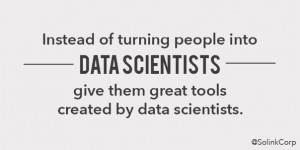The Revolution in Astronomy Education: Data Science for the Masses
by Kirk D. Borne, et al.
Abstract:
As our capacity to study ever-expanding domains of our science has increased (including the time domain, non-electromagnetic phenomena, magnetized plasmas, and numerous sky surveys in multiple wavebands with broad spatial coverage and unprecedented depths), so have the horizons of our understanding of the Universe been similarly expanding. This expansion is coupled to the exponential data deluge from multiple sky surveys, which have grown from gigabytes into terabytes during the past decade, and will grow from terabytes into Petabytes (even hundreds of Petabytes) in the next decade. With this increased vastness of information, there is a growing gap between our awareness of that information and our understanding of it. Training the next generation in the fine art of deriving intelligent understanding from data is needed for the success of sciences, communities, projects, agencies, businesses, and economies. This is true for both specialists (scientists) and non-specialists (everyone else: the public, educators and students, workforce). Specialists must learn and apply new data science research techniques in order to advance our understanding of the Universe. Non-specialists require information literacy skills as productive members of the 21st century workforce, integrating foundational skills for lifelong learning in a world increasingly dominated by data. We address the impact of the emerging discipline of data science on astronomy education within two contexts: formal education and lifelong learners.
Kirk Borne posted a tweet today about this paper with following graphic:
I deeply admire the work that Kirk has done, is doing and hopefully will continue to do, but is the answer really that simple? That is we need to provide people with “…great tools written by data scientists?”
As an example of what drives my uncertainty, I saw a presentation a number of years ago in biblical studies that involved statistical analysis and when the speaker was asked by a particular result was significant, the response was the manual said that it was. Ouch!
On the other hand, it may be that like automobiles, we have to accept a certain level of accidents/injuries/deaths as a cost of making such tools widely available.
Should we acknowledge up front that a certain level of mis-use, poor use, inappropriate use of “great tools written by data scientists” is a cost of making data and data tools available?
PS: I am leaving to one side cases where tools have been deliberately fashioned to reach false or incorrect results. Detecting those cases might challenge seasoned data scientists.
